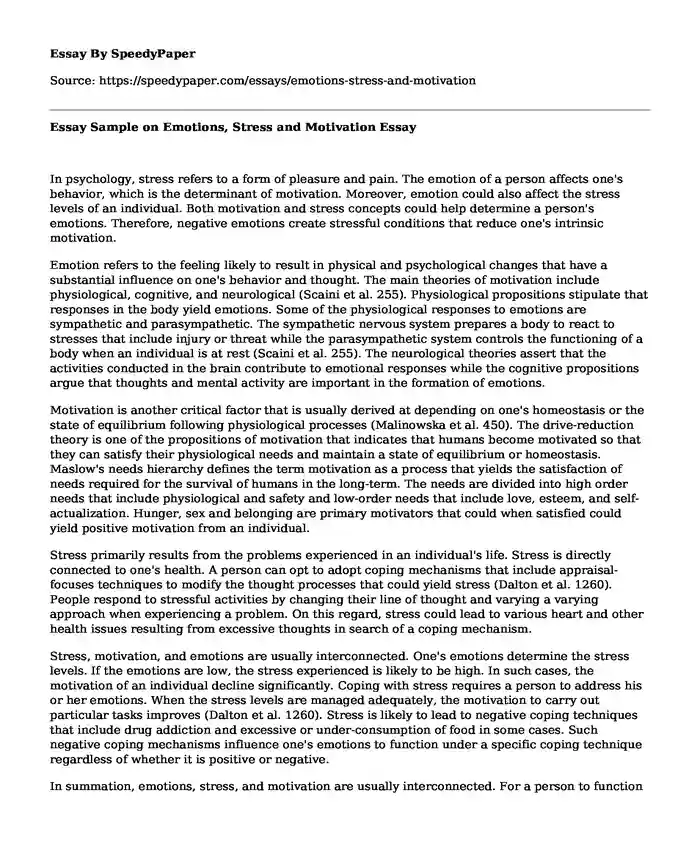
| Type of paper: | Essay |
| Categories: | Motivation Happiness Stress Mental health Emotional intelligence |
| Pages: | 3 |
| Wordcount: | 636 words |
In psychology, stress refers to a form of pleasure and pain. The emotion of a person affects one's behavior, which is the determinant of motivation. Moreover, emotion could also affect the stress levels of an individual. Both motivation and stress concepts could help determine a person's emotions. Therefore, negative emotions create stressful conditions that reduce one's intrinsic motivation.
Emotion refers to the feeling likely to result in physical and psychological changes that have a substantial influence on one's behavior and thought. The main theories of motivation include physiological, cognitive, and neurological (Scaini et al. 255). Physiological propositions stipulate that responses in the body yield emotions. Some of the physiological responses to emotions are sympathetic and parasympathetic. The sympathetic nervous system prepares a body to react to stresses that include injury or threat while the parasympathetic system controls the functioning of a body when an individual is at rest (Scaini et al. 255). The neurological theories assert that the activities conducted in the brain contribute to emotional responses while the cognitive propositions argue that thoughts and mental activity are important in the formation of emotions.
Motivation is another critical factor that is usually derived at depending on one's homeostasis or the state of equilibrium following physiological processes (Malinowska et al. 450). The drive-reduction theory is one of the propositions of motivation that indicates that humans become motivated so that they can satisfy their physiological needs and maintain a state of equilibrium or homeostasis. Maslow's needs hierarchy defines the term motivation as a process that yields the satisfaction of needs required for the survival of humans in the long-term. The needs are divided into high order needs that include physiological and safety and low-order needs that include love, esteem, and self-actualization. Hunger, sex and belonging are primary motivators that could when satisfied could yield positive motivation from an individual.
Stress primarily results from the problems experienced in an individual's life. Stress is directly connected to one's health. A person can opt to adopt coping mechanisms that include appraisal-focuses techniques to modify the thought processes that could yield stress (Dalton et al. 1260). People respond to stressful activities by changing their line of thought and varying a varying approach when experiencing a problem. On this regard, stress could lead to various heart and other health issues resulting from excessive thoughts in search of a coping mechanism.
Stress, motivation, and emotions are usually interconnected. One's emotions determine the stress levels. If the emotions are low, the stress experienced is likely to be high. In such cases, the motivation of an individual decline significantly. Coping with stress requires a person to address his or her emotions. When the stress levels are managed adequately, the motivation to carry out particular tasks improves (Dalton et al. 1260). Stress is likely to lead to negative coping techniques that include drug addiction and excessive or under-consumption of food in some cases. Such negative coping mechanisms influence one's emotions to function under a specific coping technique regardless of whether it is positive or negative.
In summation, emotions, stress, and motivation are usually interconnected. For a person to function effectively, they need an environment that favors their emotions, which in turn reduces overall stress levels. As a result, one's motivation is likely to increase.
Works Cited
Dalton, Elizabeth D., et al. "Pathways Maintaining Physical Health Problems from Childhood to Young Adulthood: The Role of Stress and Mood." Psychology & Health, vol. 31, no. 11, Nov. 2016, pp. 1255-1271. doi:10.1080/08870446.2016.1204448.
Malinowska, Diana, et al. "Job Autonomy in Relation to Work Engagement and Workaholism: Mediation of Autonomous and Controlled Work Motivation." International Journal of Occupational Medicine & Environmental Health, vol. 31, no. 4, July 2018, pp. 445-458. doi:10.13075/ijomeh.1896.01197.
Scaini, Simona, et al. "Integrating Dimensional and Discrete Theories of Emotions: A New Set of Anger- and Fear-Eliciting Stimuli for Children." Journal of Genetic Psychology, vol. 178, no. 5, Sept. 2017, pp. 253-261. doi:10.1080/00221325.2017.1351416.
Cite this page
Essay Sample on Emotions, Stress and Motivation. (2022, Dec 30). Retrieved from https://speedypaper.com/essays/emotions-stress-and-motivation
Request Removal
If you are the original author of this essay and no longer wish to have it published on the SpeedyPaper website, please click below to request its removal:
- Episode Details "Stranger in Town". Free Essay Sample.
- Business Essay Sample: Thomas Cook Group
- Free Essau Comparing "Doubt" Movie and Play
- Creative Writing Essay Example: Products' Ads
- The Road to Globalization, Essay Sample for Your Attention
- Living With Dementia: My Experience
- Moderate Red Wine Consumption: Risks & Benefits - Essay Sample
Popular categories




